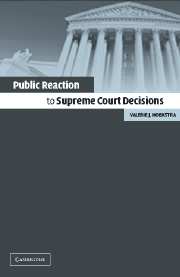Book contents
- Frontmatter
- Contents
- List of Figures
- List of Tables
- Acknowledgments
- 1 The High-Wire Act: The Supreme Court and Public Opinion
- 2 From the Marble Temple to Main Street: Placing the Cases in Political and Legal Context
- 3 Media Attention and Public Awareness
- 4 Changing Hearts and Minds? Examining the Legitimation Hypothesis
- 5 Public Support for the Supreme Court
- 6 Conclusion: Balancing Independence and Support
- Appendix A Sampling
- Appendix B Survey Instruments Included in the Analysis
- Appendix C Local and National Media Coverage of a Sample of Supreme Court Cases: 1996–97 Term
- Appendix D Statistical Issues with the Analysis of Panel Data
- References
- Index
2 - From the Marble Temple to Main Street: Placing the Cases in Political and Legal Context
Published online by Cambridge University Press: 02 September 2009
- Frontmatter
- Contents
- List of Figures
- List of Tables
- Acknowledgments
- 1 The High-Wire Act: The Supreme Court and Public Opinion
- 2 From the Marble Temple to Main Street: Placing the Cases in Political and Legal Context
- 3 Media Attention and Public Awareness
- 4 Changing Hearts and Minds? Examining the Legitimation Hypothesis
- 5 Public Support for the Supreme Court
- 6 Conclusion: Balancing Independence and Support
- Appendix A Sampling
- Appendix B Survey Instruments Included in the Analysis
- Appendix C Local and National Media Coverage of a Sample of Supreme Court Cases: 1996–97 Term
- Appendix D Statistical Issues with the Analysis of Panel Data
- References
- Index
Summary
The previous chapter introduced the research questions and the specific hypotheses investigated in this book along with the research strategy used to answer these questions and hypotheses. However, the four cases that serve as the quasi-experimental manipulations have been referred to simply as ordinary cases – ones that represent the bulk of the Court's day-to-day, term-to-term work. The hypotheses have also been presented to suggest that these cases are similar, or at least that the expectations are similar. While this is all true – these are ordinary cases, and the hypotheses should provide a general explanation of the impact of Court decisions on local public opinion – it should be equally clear that in the world of politics, nothing is ever quite equal. Each case is unique. These attributes – the issues, communities, and history – may ultimately affect the individual local communities in distinctive ways.
Although social science research strives to provide general theories and common explanations, it should also note the features of individual cases. These attributes, which often account for deviations from the predicted and general patterns, may be useful for modifying existing theories and developing new hypotheses. The following pages provide a detailed description of the individual cases, the background of the controversies, the communities where they evolved, and the actual Court decisions; this information should prove useful in anticipating and explaining the empirical results presented in the subsequent chapters.
- Type
- Chapter
- Information
- Public Reaction to Supreme Court Decisions , pp. 32 - 50Publisher: Cambridge University PressPrint publication year: 2003

